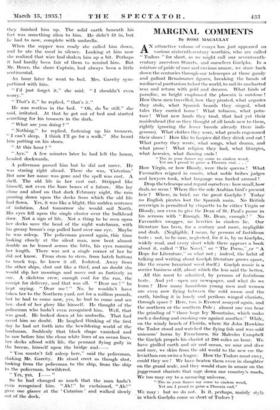MARGINAL COMMENTS
By ROSE MACAULAY
AN attractive volume, of essays has just appeared on various sixteenth-century worthies, who are called "Tudors "for short, as we might call our seventeenth- century ancestors Stuarts, and ourselves Guelphs. In a mixture of pride of race and envious amaze, we stare back down the centuries through our telescopes at those gaudy and gallant Renaissance figures, breaking the bands of mediaeval puritanism to loot the world, to sail its uncharted 'seas and return with gold and dreams. What birds of paradise, so bright emplumed the phoenix is outdone ! How these men travelled, how they pirated, what argosies they stole, what Spanish beards they singed, what tales they carried home ! What tobacco, what pota- toes! What new lands they trod, that had yet their maidenhead (for so they thought of all lands new to them, rightly ignoring the lesser breeds already there indi- genous). What clothes they wore, what pearls engemmed their shoes ! How like to harpies did they drink and eat ! What poetry they wrote, what songs, what drama, and what prose ! What religion they had, what liturgies, what heresies, what flaming ends !
" Tho in your flames my corse to cinders wend, Yet am I proud to gaine a Phoenix end. . . ."
How Virgin, or how Bloody, were their queens ! What Favourites reigned in courts, what noble bribes judges and lawyers took, what language was hurled around !
Drop the telescope and regard ourselves : how small, how drab, we seem ! Where flies the sole Arabian bird's present heir ? Where, in brief, are the great Guelphs ? Today no English pirates loot the Spanish main. No British sovereign is permitted by etiquette to be either Virgin or Bloody, nor even to give the Dean of St. Paul's pause in his sermon with "Enough, Mr. Dean, enough ! " No Favourites swagger, no heretics in cinders lie. Our literature has been, for a century and more, negligible and drab. (Negligible, I mean, by persons of fastidious taste : not, to be sure, neglected, for it is, by us Guelphs, widely read, and every short while there appears a book about it, called "The Novel," or "The Poem,"_or "A Hope for Literature," or what not ; indeed, the habit of talking and writing about Guelph literature ,grows apace, like the coarse luxuriant weed itself.) Guelph music is a sorrier business still, about which the less said the better.
All this must be admitted, by persons of fastidious taste. And yet—open any newspaper, and what do we learn ? How many hazardous young men and women are even now flying between the cold moon and the earth, birding it in lonely and perilous winged chariots, through space ? Here, too, is Everest assayed again, and the northern or the southern Pole ; almost one can hear the grinding of "those huge Icy Mountains, which make such a dashing and crashing one against another." While, on the windy beach of Florida, where Sir John Hawkins the Tudor stood and watched the flying fish and was sold unicorns' horns by Frenchmen,- Sir Malcolm Campbell the Guelph propels his chariot at 286 miles an hour. We have girdled earth and air and -ocean, we soar and dive and race, we skim from the old world to the new ere the leviathan can swim a league. How the Tudors must envy, could they see ! We have beaten them even in slaughter on the grand scale, and they would stare in amaze on the juggernaut chariots that rage down our country's roads. We too may cry to a menacing universe,
" Tho in your flames my cores to cinders wend, Yet am I proud to gaine a Phoenix end."
We may : but we do not. Is it, perhaps, mainly style in which Guelphs come so short. of Tudors ?










































 Previous page
Previous page